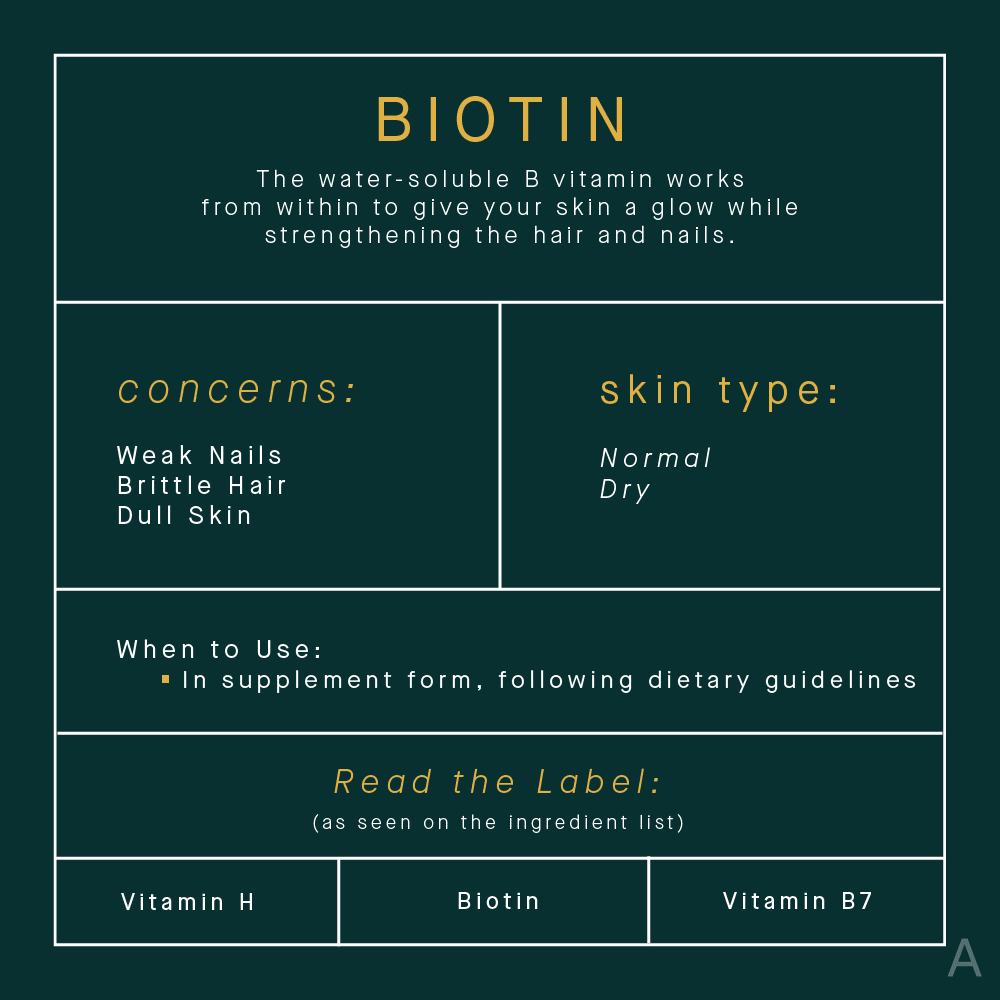 Minoxidil
MinoxidilRead The Label: All Of Your Biotin Questions Answered
Vitamin B7 (a.k.a. biotin) is known as a savior for limp hair, brittle nails, and dull skin, but can the popular vitamin really do it all? We asked the experts to find out.
Feel like you need a dictionary every time you look at the ingredient list of a beauty product? Still unsure of the difference between retinol and retinoids? What about the unique benefits of vitamins B, C, and E? Are alpha and beta hydroxy acids the same thing? The skincare aisle can be overwhelming, but you don’t need a PhD in cosmetic chemistry to navigate it. With expert help, The AEDITION is demystifying and simplifying the beauty industry — one label at a time.
Few beauty ingredients have as much name recognition and staying power as biotin. With its name plastered on hair care products and supplements, the B vitamin is synonymous with Rapunzel’s flowing tresses and strong nails. But is biotin worth its weight in gold? For those who have longed for longer locks, healthier nails, and a brighter complexion, the ingredient may prove beneficial. That’s not to say there aren’t some caveats to consider though. Before you go out and stock up on biotin-powered products, here’s what the experts have to say about the water-soluble vitamin.
What Is Biotin?
In simplest terms, biotin (a.k.a. vitamin B7) is a B vitamin. “The name ‘biotin’ is derived from the Greek word ‘bios,’” says Amy Spizuoco, DO, a board certified dermatologist and founder of True Dermatology in New York City. ‘Bios’ translates to ‘life’ or ‘sustenance,’ which makes sense when you consider how the vitamin supports metabolic and cellular function. “Also known as vitamin H, biotin is one of the B complex vitamins that help the body convert food into energy,” she adds.
Unlike some of its fellow vitamins, biotin is not naturally occurring in the body. Instead, “it is a water-soluble vitamin found in many foods, including egg yolk, milk, nuts, grains, and supplements,” explains Samer Jaber, MD, a board certified dermatologist and founder of Washington Square Dermatology in NYC. Furthermore, because it is water-soluble, it is not retained for very long. As such, it requires replenishment and, in some cases, supplementation.
What Does Biotin Do?
Biotin is more than just a beautifier; it’s an integral part of a healthy diet. Dr. Spizuoco notes that biotin is “an essential vitamin,” which means “your body needs this micronutrient to function properly.” As Dr. Jaber explains, “biotin is a cofactor for important carboxylases that catalyze critical steps in the metabolism of fatty acids, glucose, and amino acids.” Basically, “the biotin you consume in food helps your body turn the food you eat — protein, carbohydrates, and fat — into energy,” Dr. Spizuoco shares. Additionally, biotin “plays key roles in histone modifications, gene regulation, and cell signaling,” Dr. Jaber adds.
How Does Biotin Work?
Now that you have a better sense of what the B vitamin is and how it supports overall health, it’s time to drill down into the aesthetic benefits. More likely than not, you are familiar with biotin because of its purported effects on hair and nail growth. Below is what you need to know about the benefits of biotin for hair, skin, and nails:

Biotin For Hair
First things first: It is true that biotin aids hair health and, yes, growth by strengthening the hair follicle. For this reason, you will likely see it on the ingredient list of many hair supplements. But it is not a silver bullet and tends to work best when paired with complementary ingredients. If you are looking to treat hair thinning or hair loss, Dr. Jaber cautions that “there is very limited scientific data to support the use of biotin to improve hair loss in healthy individuals.” He notes that a 2018 review article by Shari Lipner, MD, in the Journal of the American Academy of Dermatology (JAAD) “highlighted that most of the publications on biotin for hair loss are limited cases or small case reports.”
So, what about the biotin in your favorite hair care products? “Topical application of biotin in products, like shampoo and conditioner, helps to enhance scalp health by repairing cracked skin, improving rash, and also by its moisturizing and smoothing effects,” explains Sreerupa Ganguly, PhD, head chemist and formulator at Pura D’Or.
Like ingestible biotin, topical biotin often works best when paired with other powerhouse ingredients. For men with androgenic alopecia (a.k.a. male pattern baldness), “a recent study shows clinical efficacy of topical biotin usage with proven results when compounded with ingredients like minoxidil, finasteride, and caffeine citrate,” Dr. Ganguly shares. And, if you’re worried about split ends, she says the “topical application of biotin improves durability and hair quality by minimizing hair split and breakage.”
Biotin For Nails
If you’ve ever taken biotin supplements, you may have noticed your nails suddenly growing longer and stronger. “Keratin is one of the main proteins that make up hair and nails, as it lines internal organs and provides structure to many glands,” says Libby Mathews, a certified nutritionist and founder of Dose & Co. As she explains, biotin helps metabolize the amino acids used to build proteins like, you guessed it, keratin. “Since keratin is one of the main components of hair and nails, it means that biotin is important for keeping hair and nails healthy and strong,” she shares.
Biotin For Skin
Biotin is not an ingredient you are going to find in topical skincare products, but Dr. Spizuoco says that having it in your diet benefits the skin. “Enzymes rely on biotin to function, and the vitamin is important for energy production as it helps the formation of fatty acids that nourish the skin,” she explains, adding that “more research is needed to support these claims in healthy individuals.” So, while it may not be consumed specifically for skin benefits, a vitamin B7 deficiency may impact the complexion.
The Right Candidate for Biotin
Because the vitamin is so readily found in food, a biotin deficiency is quite rare. With that said, Dr. Jaber says it can “result in hair loss, skin rash, and neuromuscular disorders,” and there are some groups who may be more susceptible. “Pregnant and breastfeeding women are more susceptible to a biotin deficiency,” Matthews notes, adding that signs include “brittle nails, hair loss, and skin rashes.”
If you are interested in adding a biotin supplement to your wellness routine, Dr. Jaber recommends consulting with your primary care physician first. “Biotin supplementation can interfere with lab testing results for the heart, thyroid, and hormonal testing,” he says. Additionally, it should be noted that certain B vitamins have been known to exacerbate acne. Those with acne-prone skin may be at a risk of worsening their condition if they decide to take the supplement, Dr. Spizuoco warns.
How to Add Biotin to Your Routine
Topically adding biotin to your hair care routine doesn’t take much effort. Simply find a product that you like and allow the vitamin to get to work. Those wanting to boost their biotin intake through supplements, however, should search for specific formulations (more on that below) and follow the necessary dietary guidelines. “There is nothing topically to worry about,” Dr. Spizuoco says. “However, when ingested, certain foods can prevent absorption and certain medications such as some antibiotics and anti-seizure medications.” If you have concerns about how this may impact your current routine, it is best to speak with your provider first.
As we mentioned, vitamin B7 is a pretty common component of most balanced diets, but Matthews says that there are certain foods you can try to up your intake. Those include:
- Brewer's yeast
- Cooked eggs (especially egg yolk)
- Nuts (think: almonds, peanuts, pecans, walnuts)
- Nut butters
“It is also found in beans, soybeans, blackeye peas, whole grains, bananas, mushrooms, leafy greens, sweet potatoes, cauliflower, and liver,” she adds.
How To Find The Right Biotin Product
Biotin can be applied topically to treat hair from root to tip, but, when looking for a supplement, Matthews has a few tips for what to keep an eye out for. “Look for a supplement that has a high number of servings in a bottle and is specified to be non-GMO and free from allergen supplements,” she says.
Just like with skincare, certain ingredients play well together and the same is true of biotin. Matthews recommends looking for a biotin supplement with collagen and vitamin C to boost the benefits for hair, nails, and skin. Collagen and biotin “naturally work together to deliver a powerful combination of vitamins and proteins to show an improvement in hair loss, weak nails, and skin appearance,” she shares, adding that biotin “can also boost absorption and production of collagen.” The Dose & Co. Collagen Tablets are specifically formulated with vitamin C and biotin “for better absorption and added beauty benefits,” Matthews says.
The Takeaway
If you are a healthy individual with a well-balanced diet, there is a good chance you are already receiving all the biotin you need on a daily basis. The water-soluble vitamin is an essential part of metabolic and cellular function, which partly explains its aesthetic benefits for hair, nails, and skin. While you may be tempted to hit ‘add to cart’ on a biotin supplement, be sure to speak with your PCP or dermatologist first. At the end of the day, there is still a lot of research left to be done.
All products featured are independently selected by our editors, however, AEDIT may receive a commission on items purchased through our links.
More Related Articles
Related Procedures

AI Plastic Surgeon™
powered by'Try on' aesthetic procedures and instantly visualize possible results with The AI Plastic Surgeon, our patented 3D aesthetic simulator.

